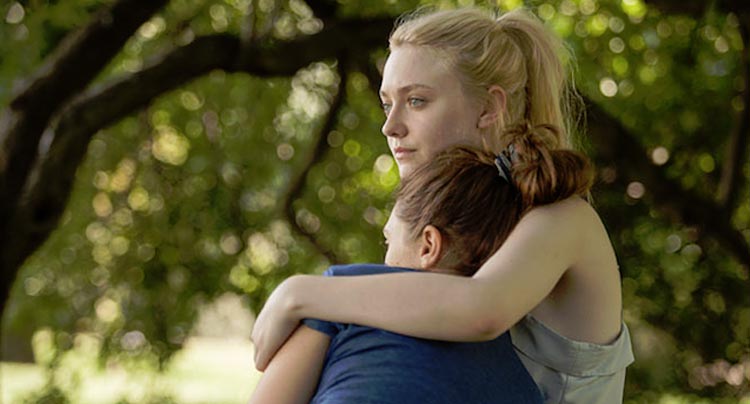
A summertime love-triangle wastes an abundance of talent in this tempting but not tasty friendship film.

A summertime love-triangle wastes an abundance of talent in this tempting but not tasty friendship film.
A well iced cake can look quite pretty, but if it’s undercooked it won’t taste very good. Naomi Foner’s directorial debut Very Good Girls has some delicious icing, including excellent performances from Dakota Fanning and Elizabeth Olsen, and plenty of trimming in the way of Demi Moore, Richard Dreyfus, Peter Sarsgaard, Clark Gregg, and Boyd Holbrook, but its under-developed plot and overly sentimental premise leave it ooey and gooey in the middle with not even a sugar rush to make up for its failings.
First premiering last year at Sundance, Very Good Girls is marketing itself as a virginity pact movie, but that’s not quite accurate. Other than a brief conversation held between best friends Gerry (Elizabeth Olsen) and Lilly (Dakota Fanning) at the beginning of the movie, where they discuss first Lilly catching her father cheating on her mother and then the strange notion of parents having sex in general before moving on to their own unappreciated virginity, there is no real plot to become de-virginized. The film is a friendship story, focusing on the strange purgatory that is the summer between high school and college. As if dealing with their various family issues, creepy bosses, and annoying siblings aren’t enough to keep them occupied the girls’ friendship is tested most when they meet David (Boyd Holbrook), a sexy ice-cream vendor at the beach who likes taking pictures. They both take an interest in him, but Gerry, being the more vocal of the two, marks her territory by constantly discussing her interest in him and by pseudo-stalking where he works. Of course, as these things are apt to go, David was much more interested in the darker, quieter, Lilly and seeks her out.
The unfortunate part of love-triangle stories is ensuring that each thread of the entangled relationships is given enough depth. Very Good Girls has an obvious loose thread. David’s pursuit of Lilly and the ease in which she slips into a secret relationship with him is mostly non-sensical. Considering at her day job she has a boss (Peter Sarsgaard) who is consistently hitting on her, you’d think she’d execute a bit more caution when another almost-stranger exhibits what so obviously seem to be shallow motivations for pursuing her. But the film doesn’t claim to be the great love story of the century, so it’s slightly excusable. Tensions build as expected as the repercussions of forbidden romance ensue.

Elizabeth Olsen makes the most of her artistic-minded, self-centered character, but seems a bit too much like an archetype: girls who can attract men, but not obtain them. Equally archetypical is Dakota Fanning’s Lilly, who does her best to get away with wide-eyed staring equaling out to implied depth and understanding, when really she’s just a shy, white-collared girl with some pent-up daddy issues. And winning Most Abused Stereotype is artist David with his sullen ways, who speaks of some day visiting Paris and even reads Sylvia Plath to Lilly before first kissing her.
The film wastes talent in abundance. Even the film’s music, done by Rilo Kiley’s Jenny Lewis, seems to be trying too hard as we hear her familiar voice in almost every scene. There are some questionable wardrobe choices as well, as though the costumer didn’t think we’d understand the essence of the characters with simple words and actions, they needed to be outlandish in their outfits. If they’d been thrown into a film set in the 60s, maybe the completely illogical actions of the characters would make more sense. Unlikely and ill-advised romance, childish secrets and silly pining away for a boy without much to offer — it’s all just so incredibly un-modern.
The locations and lighting of the film do give off a definite summery vibe, and younger female audiences are likely to be drawn to the film’s stars and suggested plot, but like I said, no matter how you cut it, this cake ain’t cooked.
The film is now available on VOD on iTunes and Google Play.